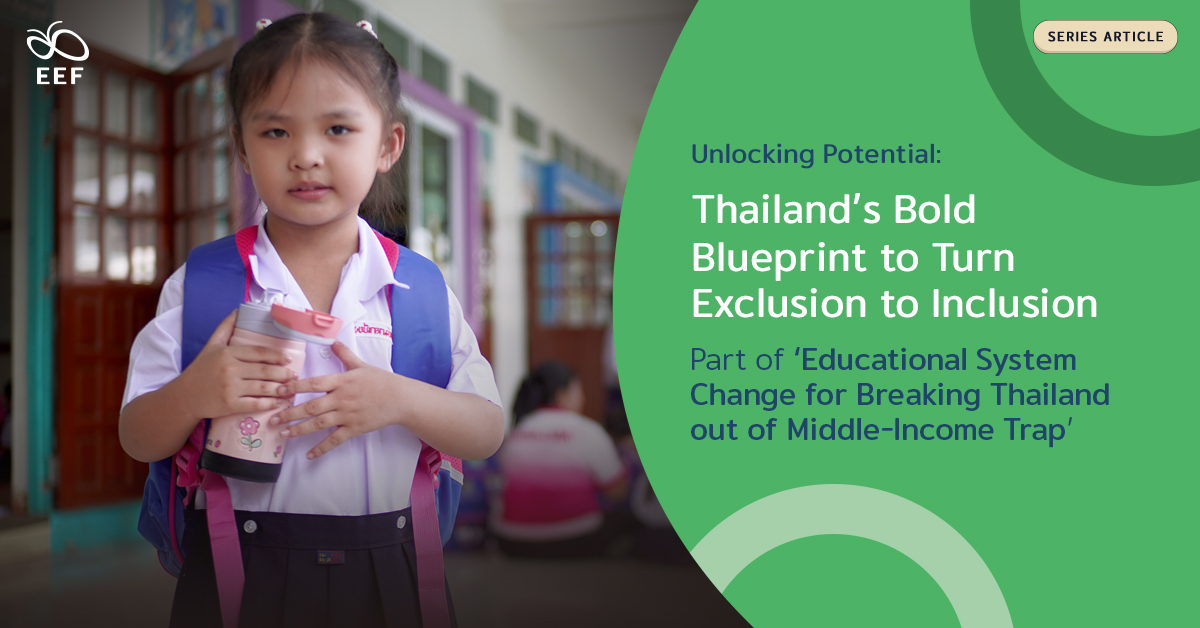
What happens when a country with global ambitions discovers its greatest untapped resource lies not in factories, but in classrooms its children may never enter? Thailand’s long-held bid to break free from the middle-income trap hinges upon a silent crisis: the persistent exclusion of its children and youth from education. Whether out-of-school, at risk of dropping out, or disengaged from education, employment, or training altogether, these young individuals are not just a moral concern; they are a brake on progress. Without a system that reaches, supports, and equips every child to thrive, Thailand risks losing an entire generation of “Lost Einsteins”—those innovators, workers, and citizens, both would-be and would-have-been, had they only been given the chance. No longer enough is incremental reform enough; imperative is nothing short of a fundamental system change in access, equity, and opportunity, and at scale.
In the second of this two-part article series, Dr. Kraiyos Patrawart, Managing Director of the Equitable Education Fund (EEF) Thailand, revealed how the country has been tackling two quieter yet persistent challenges in educational exclusion: preventing dropouts among the poorest and expanding opportunities for resilient learners. Through strategic investment and innovation, the EEF is reshaping inclusive, future-ready education to help the nation break free from the middle-income trap.
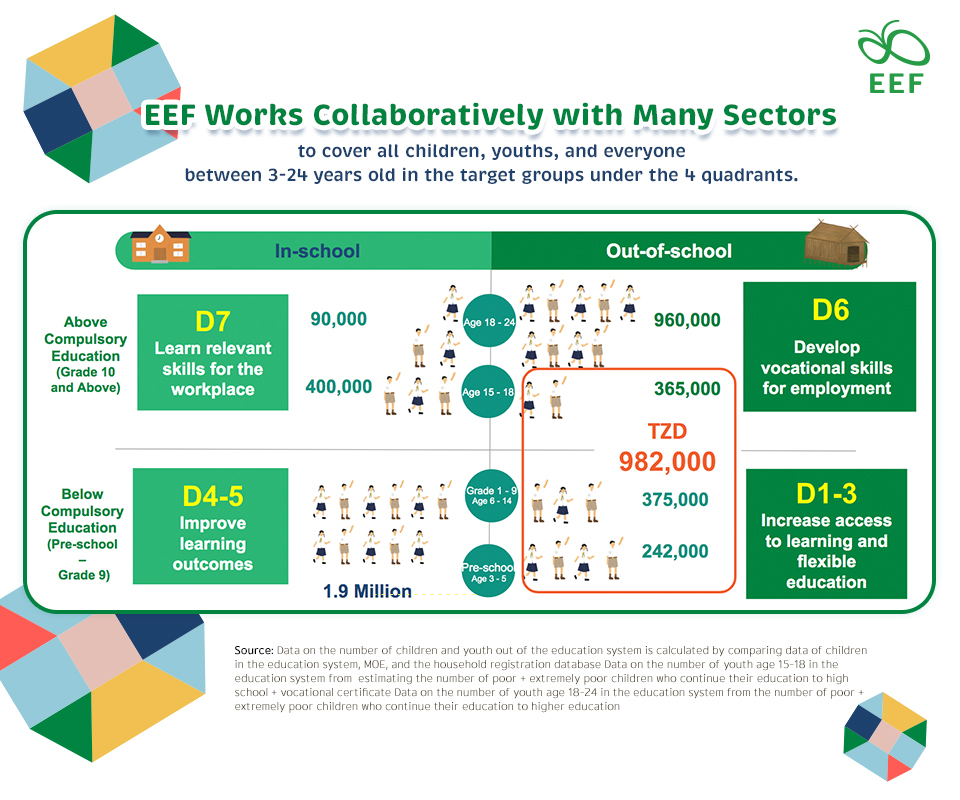
When it is poverty—not potential—that keeps children out of school, sometimes the smartest investment is not in schools themselves, but in the lives that surround them. In 2024, nearly 1.9 million students in Thailand are at high risk of dropping out, largely due to deep poverty and social marginalization. To confront this urgent challenge, the EEF has launched the “Conditional Cash Transfer (CCT).” By providing direct financial aid to the families of vulnerable students, the initiative alleviates immediate economic pressures—covering costs such as school supplies and transportation—and incentivizes regular attendance, significantly improving the chances that children stay in school.
At its core, the CCT seeks to remove barriers for students from the poorest 15% of households by delivering essential financial support to prevent dropouts. To scale this effort nationwide, the EEF has ensured the CCT can be readily implemented by educational institutions for consistent, effective delivery. The process begins with more than 400,000 teachers conducting regular home visits, using a mobile app to gather detailed data on family income, assets, and living conditions. This data is then uploaded to the EEF’s comprehensive Information System for Equitable Education (iSEE), which integrates records from six relevant ministries and applies geographic mapping to identify areas with the greatest educational need. Through a proxy means test, the system generates poverty scores for each child, which are subsequently verified by village leaders and school boards to ensure accuracy and build community trust. Verified data is then shared with the ministries to guide targeted support and resource allocation.
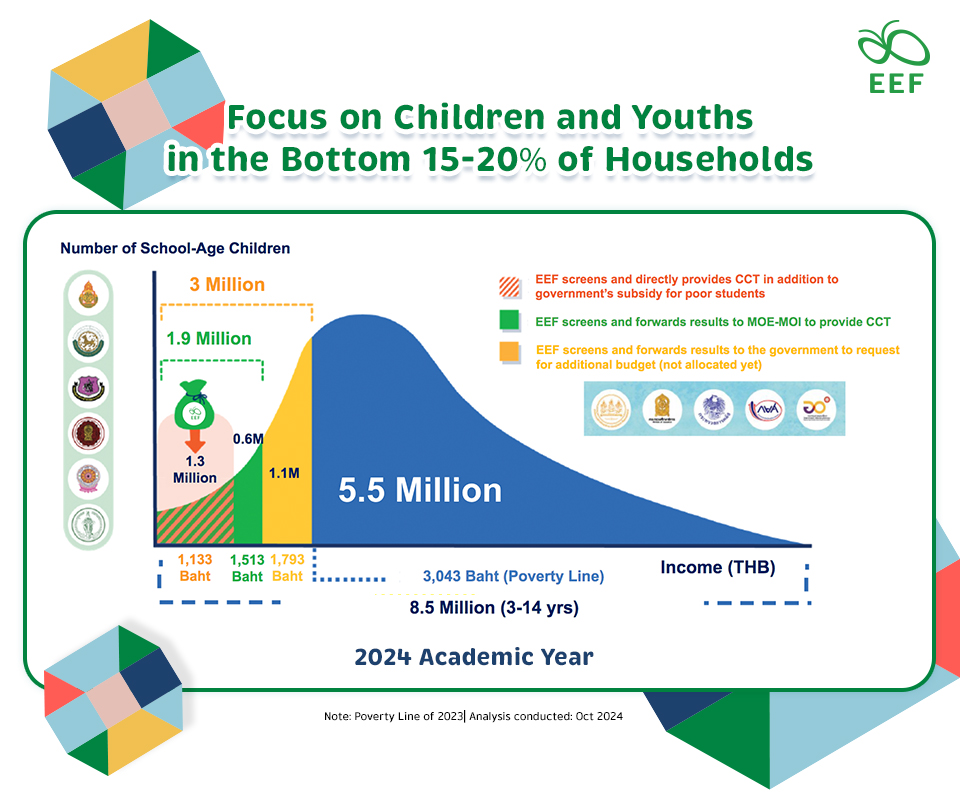
Out of 8.5 million children aged 3 to 14, roughly 3 million live below the official poverty line of 3,043 Thai Baht per month. Through the CCT’s data-driven identification process, the EEF has distributed conditional cash transfers to over 1.3 million students from the Very Poor group according to its criteria, supplementing government subsidies to ease essential costs and reduce dropout risk. Meanwhile, another 0.6 million children receive transfers managed by the Ministry of Education (MOE) and the Ministry of Interior (MOI) and Interior (MOI), while the remaining 1.1 million children identified as living in poverty are supported through funds to be allocated by six additional educational agencies.
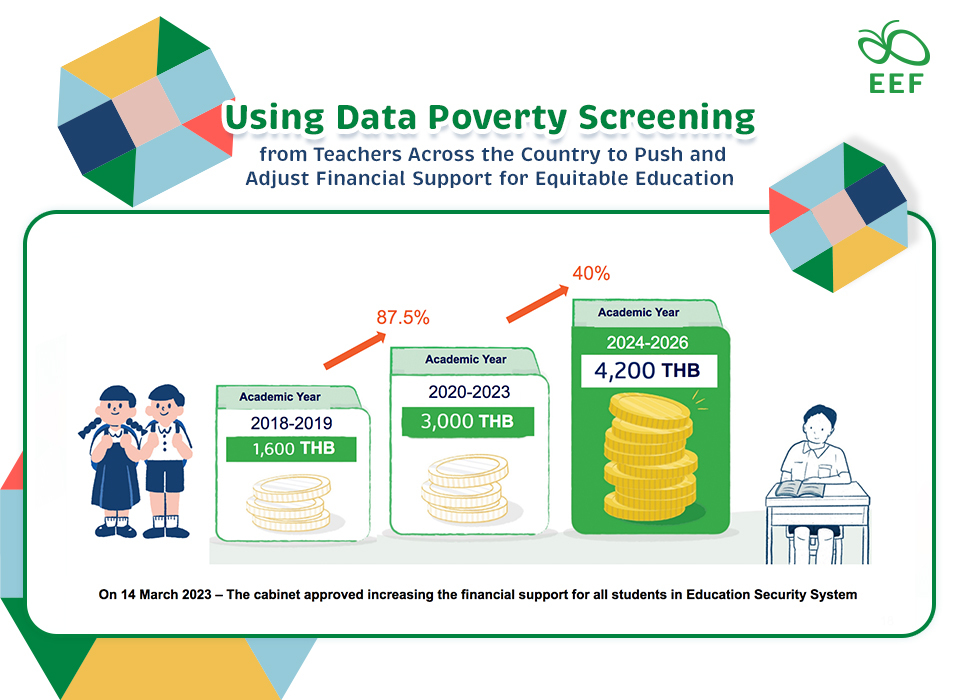
Government investment in the initiative has increased steadily, beginning with an annual allocation of 1,600 Thai Baht per student in 2018 and rising to 4,200 Thai Baht today. This funding supports early intervention efforts aimed at long-term student retention. By combining targeted cash transfers with a scalable, data-driven identification system and integrating them into broader dropout reduction strategies, the CCT initiative systematically addresses the financial barriers faced by vulnerable students. Through this comprehensive approach, the EEF works to keep at-risk children enrolled and advances the goal of a more equitable educational system.
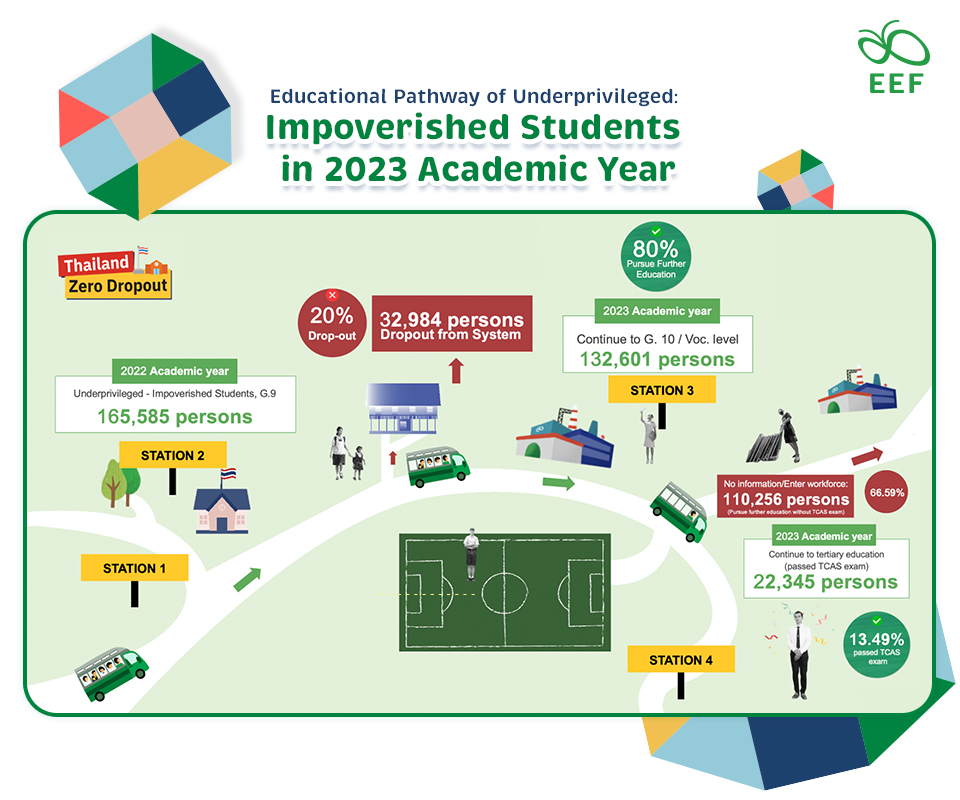
Keeping at-risk students in school is only half the equation; the EEF has also been working to reintegrate both recent dropouts and those long absent from the system by offering flexible learning pathways that accommodate diverse needs and life circumstances. Central to this effort is the “Outstanding Development Opportunity Scholarship (ODOS),” which targets academically talented students from low-income families at a critical transition point: completion of Grade 9, where dropout rates increase sharply. Recognizing that 20% of students leave after compulsory education, 67% drop out by the end of high school, and only 13% pursue college—far below the global average—the ODOS aims to close these dropout gaps at every stage to support Thailand’s goal of becoming a high-income nation.
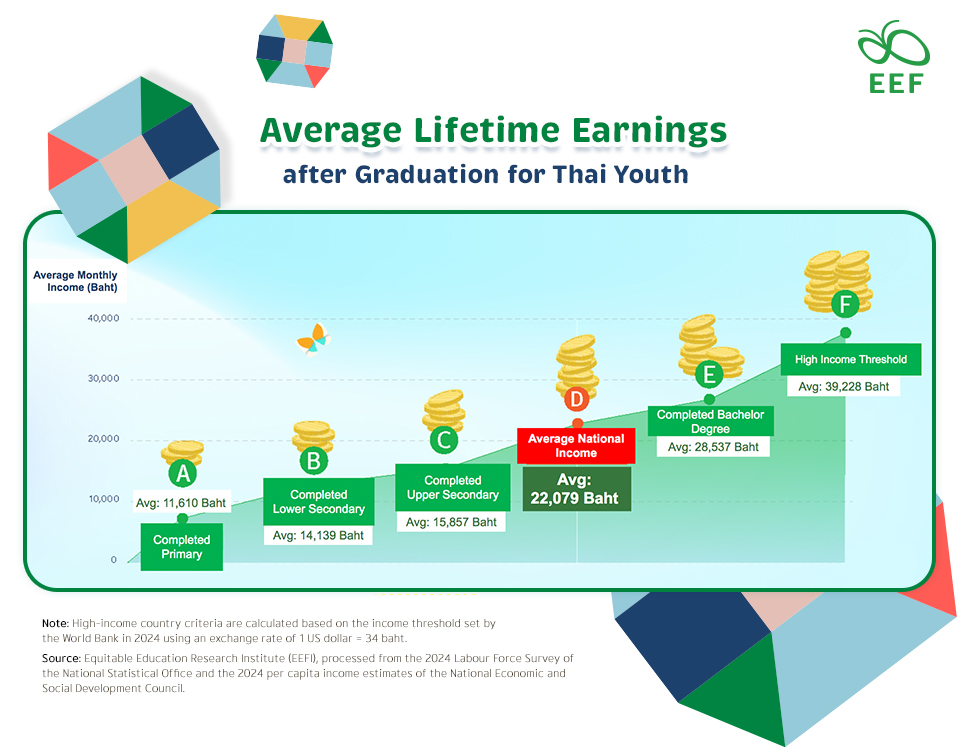
Full scholarships under the ODOS are awarded to high-performing students whose families earn no more than 12,000 Thai Baht per person monthly. Candidates undergo a selection process based on rigorous national academic standards designed to prepare scholars for the challenges of higher education. The initiative then provides financial support enabling these students to pursue college studies, particularly in STEM fields. Recently, the initiative has received formal endorsement by Prime Minister Paetongtarn Shinawatra and the Cabinet, with funding secured through a 5.3-billion-Thai-Baht charity lottery. This funding will support over 1,200 students, 100 of whom will study abroad in countries including the U.S., U.K., and Australia, while the remainder will attend universities within Thailand.
This represents the country’s first government-funded full scholarship dedicated to low-income students pursuing STEM studies internationally. By systematically identifying talented youth, supporting their transition to higher education, and targeting critical dropout points, the ODOS aims to raise average monthly incomes from 22,000 to nearly 40,000 Thai Baht, contributing significantly to Thailand’s economic advancement.
Looking ahead, the rapid advancement of AI and digital technologies offers new opportunities to break down educational barriers even further. Moving beyond equal access toward truly equitable outcomes requires education systems that are adaptive, responsive, and inclusive, —driven by innovation and sustained through focused investment to ensure every child, regardless of background, can realize their full potential.
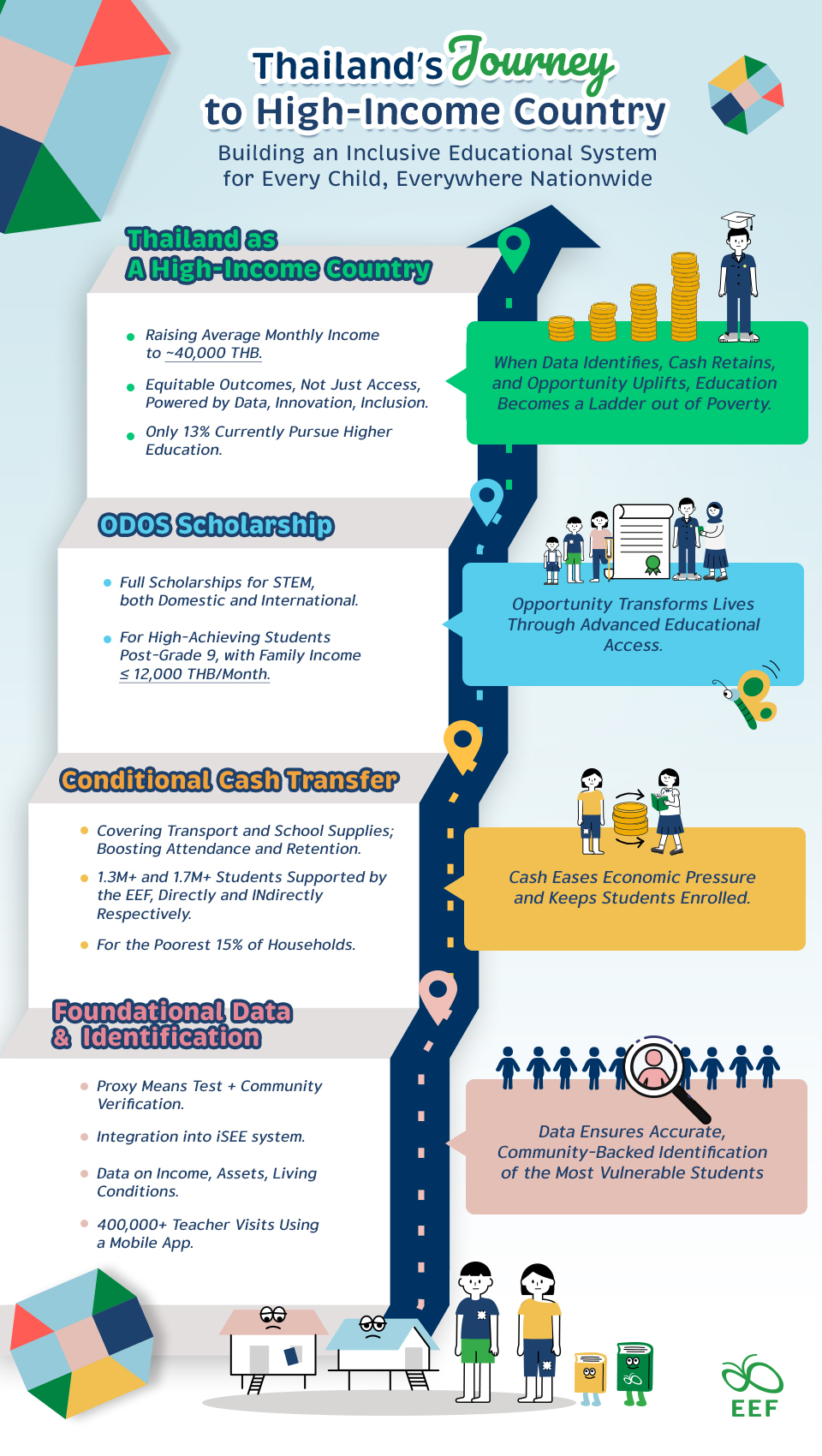
What if a nation’s greatest resource isn’t found in factories but in classrooms, many children may never enter? Thailand confronts this question head-on, tackling the persistent exclusion that has long limited its youth and, by extension, its future. Through the Equitable Education Fund (EEF) Thailand, the country moves beyond fragmented reform toward systemic transformation. By identifying vulnerable students through real-time poverty data, investing in conditional cash transfers, creating flexible reintegration pathways, and expanding access to higher education with full scholarships, Thailand fundamentally reshapes education as a personalized journey toward lifelong learning and opportunity.
This national strategy rests on equity, inclusion, and innovation, ensuring every child—not only the privileged few—can stay in school, succeed, and thrive. By doing so, Thailand averts a generational crisis and builds the human capital essential to break itself free from the middle-income trap. Powered by adaptability, data-driven action, and strategic investment, the EEF transforms exclusion into inclusion and potential into productivity. Its bold commitment sends a clear message: in a world where sustainable growth depends on knowledge, creativity, and resilience, equitable education is not a moral luxury; it is a strategic imperative. The future begins in classrooms, not factories.
All For Education is all about people; only when all is in for education is Education For All. Join the movement to reduce educational inequality. Support the EEF by donating to fund research, partnerships, and assistance for children, youth, and adults in need of educational support. Click the link to contribute today and help create a society where education is open and equal for all. Together, we can make a lasting impact.

